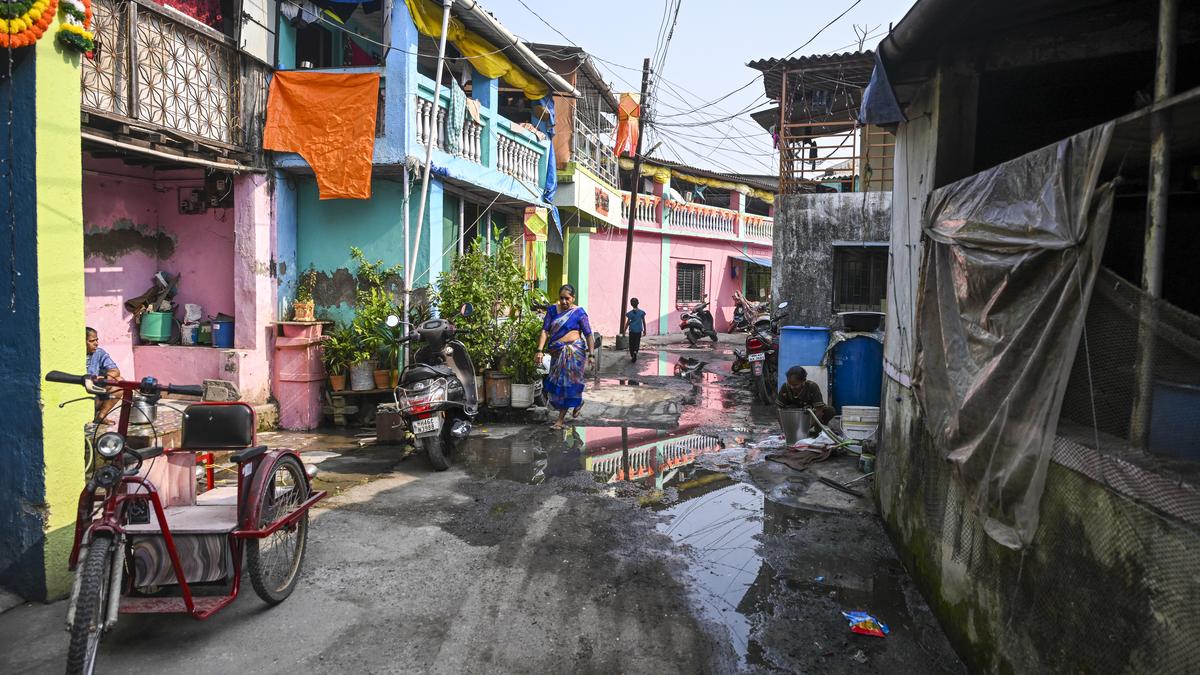
40 years in a transit camp
The Hindu
Sheva koliwada, a fishing village near Mumbai, struggles for compensation and permanent homes after 40 years of displacement.
On Deepavali evening, Sheva koliwada (fishing village) does not see any grand celebrations. A few hutments hang colourful handmade paper kandils (lanterns). Approximately 54 kilometres from India’s financial capital, Mumbai, also Maharashtra’s capital, the village in the Uran taluka of Raigad district, has about 600 families, say villagers. The one-room homes made of single-brick walls have tin roofs and no windows.
“There should be money and a reason to celebrate festivals. Our life has been in darkness for the past 40 years. We will only celebrate Dusshera and Deepavali after we move to our permanent homes,” says Ramesh Bhaskar Koli, 65, a fisherman. He was 25 when he moved to the Sheva koliwada transit camp with his parents, siblings, uncles, aunts, and grandparents. A joint family of 15, they still live together, extending their one-room structure to accommodate them all.
In 1984, the Jawaharlal Nehru Port Trust (JNPT) township project was coming up. The people of what was then Sheva gaon (village), in what is now Navi Mumbai, were moved to two transit camps, 12 km away, their current location. The fisherfolk got Boripakhadi village, also called Hanuman or Sheva koliwada; the farmers got Bokadvira village, also called Navin Sheva.
They were promised compensation for the loss of their land, livelihood, and way of life. In their original village, Sheva gaon, nature had given them an abundance of livelihood opportunities: there was salt from the salt pans, fish from the creeks, and fertile land where agriculture thrived. Much of what they produced, including paper from the grass, was sent to then Bombay.
After a government survey to gauge the number of households was held in 1986, it was determined that there were 256 koli families and 364 farmer and other families, to whom compensation was due. Villagers claim that they have not been compensated, new homesteads were never built for them, and they have no proof that they own the land they have lived on for 40 years now. Now, the fisherfolk have decided to boycott the Assembly election in Maharashtra, that is to be held on November 20. Earlier this year, they refused to vote in the Lok Sabha election too.
“We were given an 8x8 sq. ft home, with just one room to cook, sleep, and live in. Over the years, we reclaimed the creek in the backyard and extended the house,” Ramesh says. During the rains, sewage water enters the house. “We did not have money to get the reclamation done properly. Worms wriggle in,” he says. Ramesh is the general secretary of the Maharashtra Small-Scale Traditional Fish Workers Union that has been fighting for compensation and land for the past three decades.
JNPT was commissioned in 1989, and about 1,172 hectares of land was acquired for it through the City and Industrial Development Corporation (CIDCO), Maharashtra’s town planning agency, between 1983 and 1986. The port handles about half of all cargo across India’s major ports.











